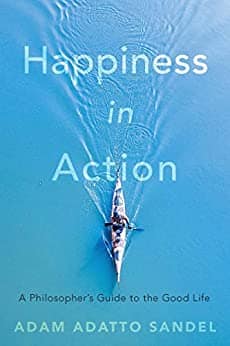The fulfilment of goals, Sandel writes, gives us fleeting pleasure. Genuine friendships and doing things for their own sake have a more lasting effect, he argues. (Representational image: Jarritos Mexican Soda via Unsplash)
Happiness In Action by Adam Adatto Sandel is an antidote to tiresome and tedious self-help literature - a genre that now seems to be saturated with productivity hacks and promises of life-altering transformations which never come through.
 Finding happiness, Sandel explains, is not a step-by-step process but one which “pervades the whole of what we do and is not merely an escape from the rest of the day.”
Finding happiness, Sandel explains, is not a step-by-step process but one which “pervades the whole of what we do and is not merely an escape from the rest of the day.”
Happiness In Action, then, is a self-help book that breaks away from the stepwise-guide-to-happiness format, yet retains the preachy tone we often see authors of self-help books use.
The key to happiness
As Sandel takes the readers on the journey to find happiness, he produces a sharp critique of the hustle culture and goal-oriented striving which, he says, have modern employees in a chokehold, more so in the post-pandemic world.
Sandel argues that the root cause of our unhappiness is chasing goals. Once achieved, these goals give us momentary happiness which slips away the second we set our eyes on the next set of goals and the cycle repeats. The solution to this, Sandel says, is activity for its own sake.
In the chapters that follow, Sandel stresses on the importance of doing things not because they contribute towards our goals but for the sake of doing them. The idea of ‘activity for the sake of it’ seems refreshing because it challenges the notion of activity for a purpose, profit and towards a goal.
Sandel suggests three virtues to help the current generation find happiness: self-possession, friendship and engagement with nature.
Self-possession
Sandel seems to endorse Socratic views on self-possession - one should seek knowledge for the sake of it.
As a philosopher, Sandel seems to be acutely aware that one might confuse being adamant and unflappable with self-possession. He, therefore, takes it upon himself to dispel myths around the concepts he discusses in the book and explains them in a manner which is lucid and educational without being condescending.
Sandel's critique of goal-oriented striving, too, is well reasoned. He acknowledges that goals are rather essential to put food on the table and have a roof over our heads, but adds that there are more important things in life that we must address.
Genuine friendship
Sandel then proceeds to talk about friendship. He writes that of late allies who share the same ideas as us seem to have taken precedence over forming genuine emotional bonds. The friendship is therefore not a friendship at all but an alliance which serves a purpose.
Perhaps, this is Sandel’s way of shutting down the contentious ‘friends over politics vs politics over friends’ debate. Modern philosophers talk about having allies and treat friendship as ‘a rival to universal concern’ but Sandel says on the contrary, it is friendship which comes to our rescue in case of misfortune.
Sandel’s take on modern-day friendships is refreshing and nuanced. When the elected leaders and government officials fail to come to our rescue in times of crisis, it is the friends - the ones we disagree with over politics - who help us sail through tough times.
Sandel cautions the readers that having allies with similar views on politics and social justice can only get them so far. One must seek friendships which do not serve a purpose other than just being pleasurable and fun - for it is those friendships that really matter in the long run.
Engagement with nature
Sandel, in chapter 4, tackles the complex subject of engaging with nature. He says that most environmentalists seem to care about pollution, depleting forest cover and climate change only because it affects humans.
One might feel the urge to dismiss Sandel’s views at first, but we must ask ourselves: do we care about climate change because we should care about it as citizens of the planet? Or is it because of the storms, floods and heat waves that are killing thousands across countries?
Sandel holds the rather selfish motivation behind saving the environment accountable and gives us all a much-needed reality check. Why do we care about environment only when the s**t hits the fan and people die? That is a conversation all of us need to have with ourselves.
Sandel also believes that many modern philosophers seem to operate with an assumption that human needs are always in conflict with nature's forces. He argues that philosophers must do away with the distinction between nature and humans and view both as an ‘immersion’ which makes up our world.
The author’s take on viewing humans and nature as complementary forces rather than polar opposites might just remind you of Ruskin Bond’s short stories where humans and nature (mostly) peacefully coexist. The idea is not new but well-articulated, especially in the context of finding happiness.
Whether or not Happiness In Action helps you find happiness, it will make you introspect. It will make you question if life is all about moving aimlessly from one goal to another or for once, doing the things we love to do, even if they don’t help us achieve anything of value.
Happiness in Action: A Philosopher’s Guide to the Good Life by Adam Adatto Sandel was published by Harvard University Press in September 2022.